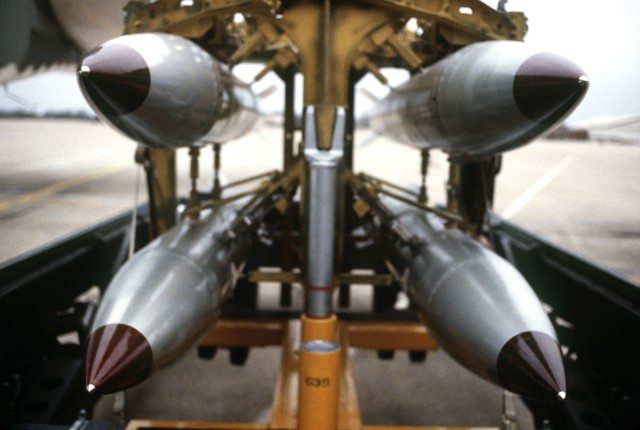The United States urged a reluctant Russia on Thursday to engage in talks to extend a program that has helped disarm thousands of ex-Soviet nuclear warheads and missiles.
Russian officials said this week that they had notified Washington that the Nunn-Lugar program, due to expire in May 2013, would not be extended, in the latest challenge to a vaunted “reset” of US relations with the Kremlin.
But the Obama administration said that it understood Moscow wanted revisions to the program and that it was ready to continue negotiations about it.
“There’s surely more work to be done in that program and we’re going to engage in that effort,” White House spokesman Josh Earnest told reporters aboard Air Force One.
At the State Department in Washington, spokeswoman Victoria Nuland said that US diplomats started talking to Moscow about the 20-year US-financed program’s renewal in July, and that discussions were still going on.
“They have told us that they want revisions to the previous agreement. We are prepared to work with them on those revisions, and we want to have conversations about it,” Nuland said.
“This is a program that has paid dividends for the Russian people, for the American people. It’s paid dividends globally, and we hope to be able to continue it.”
Deputy Russian Foreign Minister Sergei Ryabkov said on Wednesday that Moscow wanted to end the program, named after former senator Sam Nunn and retiring Indiana Senator Richard Lugar.
“The American side knows that we do not want another extension,” Ryabkov told Russia’s Interfax news agency. “This is not news to the American side.”
The report said Ryabkov was responding to Russian newspaper speculation that the initiative had been shut down as a consequence of the Kremlin’s decision to kick out the USAID development program organized by the US embassy in Moscow.
USAID has been ordered out of the country over accusations it supported opposition leaders who helped organize a wave of demonstrations against President Vladimir Putin’s rule.
But Ryabkov said the Nunn-Lugar decision was in no way related to the USAID case.
Lugar, who is leaving the Senate after losing a Republican primary challenge, traveled to Russia in August to talk about extending the deal.
He said in a statement on Wednesday that he knew Russia wanted to make changes to the deal rather than to simply extend it.
“At no time did officials indicate that, at this stage of negotiation, they were intent on ending it, only amending it,” he said.
The Nunn-Lugar plan was created in 1992 after the breakup of the Soviet Union amid worries over the fate of the Soviet Union’s vast arsenal of nuclear as well as chemical and biological weapons.
It began with an effort to safeguard materials by improving security at nuclear complexes and graduated to decommissioning work.
Ryabkov suggested that Moscow was starting to feel constrained by the deal because it gave Washington access to sensitive information that Moscow could not get about America’s nuclear arsenal.
Lugar says the scheme has deactivated 7,610 strategic nuclear warheads and destroyed 902 intercontinental ballistic missiles and 906 nuclear air-to-surface missiles along with 684 submarine launched ballistic missiles, among other stockpiles that have been eliminated.











